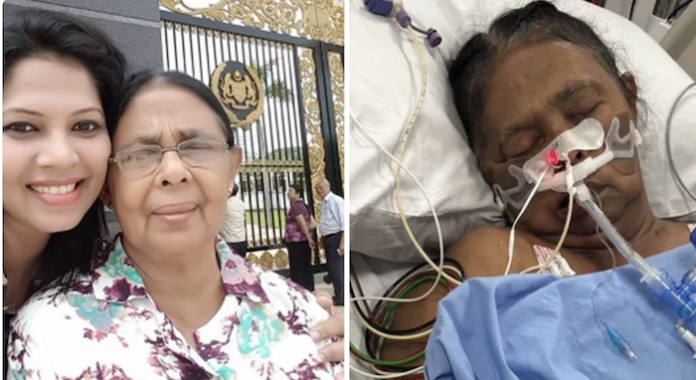In a distressing turn of events, a 74-year-old Sri Lankan woman, Carmel Rodrigo, visiting her family in Melbourne, Australia, has had her left hand amputated after contracting a rare and aggressive flesh-eating disease. The senior citizen had been enjoying her time with her daughter, Gayathri Perera, and her family, when she suddenly began to experience severe pain in her left arm.
Carmel, who arrived in Australia earlier this year, initially felt well and spent months engaging in family activities and sightseeing. However, last month, her condition took a drastic turn for the worse. According to Gayathri, her mother became “delirious” one night, screaming in pain as her hand swelled and turned slightly blue.
“She was in excruciating pain, and her hand looked like it was swelling and turning blue,” Gayathri recounted in an interview with Yahoo News. Despite rushing her mother to the emergency room, the pair faced a long wait before Carmel began to lose feeling in her arm, leading to fears of paralysis.
Medical professionals struggled to identify the infection due to its rapid progression. “The doctors said it was an infection, but they couldn’t recognize which kind. The spread was really fast. I was told to pray because she only had a 10 percent chance of survival,” Gayathri said.
Carmel was eventually diagnosed with Buruli ulcer, a rare and severe disease often referred to as the “flesh-eating” disease. Buruli ulcer, caused by the bacterium Mycobacterium ulcerans, results in extensive damage to the skin and soft tissues. The disease is known to be spread by mosquitoes and other animals and has been previously reported in several Australian states.
In an effort to save her life and stop the disease from spreading further, doctors decided to amputate Carmel’s left hand. She has been kept sedated in the hospital for the past three weeks, as her pain would be “unbearable” if she were conscious, according to her daughter.
The family, who had recently moved to Australia, is now facing an uphill battle as they hope for Carmel’s recovery. Gayathri remains by her mother’s side, providing support during this difficult time.
Buruli ulcer remains a significant public health concern, particularly in certain regions of Australia. The bacterium that causes the disease thrives in specific environmental conditions and is typically spread through the bite of infected mosquitoes. Symptoms include painless nodules that can develop into large ulcers, potentially leading to severe tissue damage if not promptly treated.
This tragic incident underscores the importance of awareness and early detection of such rare diseases. The medical community continues to research and develop more effective treatments for Buruli ulcer to prevent such severe outcomes in the future. Meanwhile, Carmel Rodrigo’s family remains hopeful for her recovery as they navigate the challenging journey ahead.
4o


